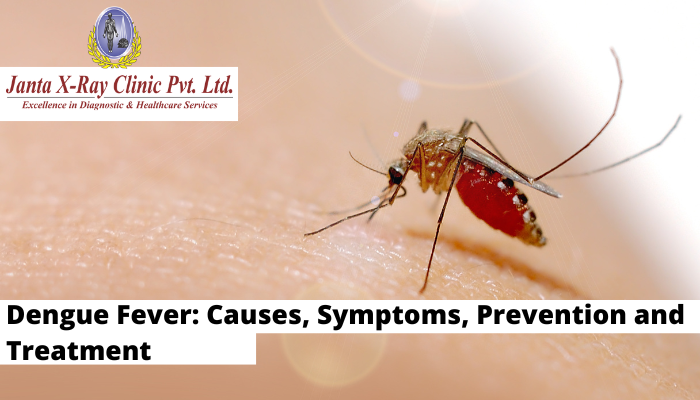Dengue On the Rise: Symptoms, Tests and Treatment - Janta X-Ray

While fever is a common thing that a number of reasons can cause, in most cases, the fever drops down in a few days if the body functions are working correctly. However, this is not the case in terms of dengue fever. Dengue fever is not like your regular fever caused by colds, viral infections, or other reasons.
Dengue fever can be much more severe if left untreated. It is a mosquito-borne disease. The Aedes mosquito is proven to be the carrier of the four dengue viruses that have been stated to be the cause of dengue fever. These viruses and the Aedes mosquitoes are primarily found in tropical or subtropical areas worldwide.
The most common symptom of dengue is high fever coupled with other complications that can cause pain and discomfort, and in some cases, it may even be the reason for somebody’s death. Dengue is a common disease that affects several million each year. However, among the ones who got affected, roughly 20% showed some symptoms among those who got affected. On the other hand, most people remain asymptomatic and may not get sick to a severe extent.
Those who show symptoms of contracting one of the four viruses may require medical intervention. Even though you show any symptoms, it only takes a few days of rest, a healthy lifestyle, and pain medications to get better. In the case of severe dengue, it gets a bit complicated, and if not recognized early, it may even cost a life. As a tropical disease, dengue is most common in the Indian subcontinent, Africa, the Caribbean, South Asia, South China, and many other places worldwide.
A Brief Explanation Of Dengue Fever
When a dengue-infected Aedes mosquito bites a person, it infects an entirely healthy human being with one of the four DENV viruses. The virus gets a free pass to enter the human bloodstream as the mosquito bites the person. The virus rapidly replicates and starts spreading.
The virus within the bloodstream causes the body’s immune system to be highly active. This process alone can make a person feel sick until the onset of symptoms. However, as the fever comes and other painful symptoms start kicking in, it would be easy to understand the cause.
As mentioned earlier, in most cases, the symptoms will subside with rest, nutritious food, and some pain medications if the patient feels severe discomfort. The mosquito can only transfer one of the four viruses, but if the patient contracts another type of the DENV virus, the condition can turn severe. This state is medically known as severe dengue, dengue shock syndrome, or dengue hemorrhagic fever.
Dengue hemorrhagic fever can turn out to be fatal if not treated at the right time. Therefore, it is essential to notice the warning signs, which generally occur after the fever has worn down. After entering the bloodstream, the DENV viruses damage the vessels and severely harm the platelet count of the body.
The platelets in our bloodstream play an integral role in blood clots when the blood vessels get damaged. The virus affects the platelets and damages the vessels; it causes the blood to leak internally. This could appear as bruises all over the body. This condition is tricky and may lead to internal bleeding, organ failure, shock, or even death.
What Are The Signs & Symptoms To Look For In The Case Of Diagnosing Dengue Fever?
Dengue fever attacks when you get bitten by an Aedes mosquito carrying one of the four dengue viruses. As mentioned before, most people remain asymptomatic in the earlier phases of the attack. However, those who do show some signs will start showing by 2nd or 3rd day of the bite. The signs and symptoms of dengue fever consist of a number of things. Those instances are pointed out below.
-
The patient will get a high fever, almost 104 °F or 40°C.
-
They may also have headaches and muscle and joint pains all over the body.
-
They could also feel lightheaded, nauseous, and even vomit a few times.
-
Pain behind the eyelids could also show up at the onset of the attack.
-
The patient could also experience swollen glands or rashes around the body.
In most cases, these symptoms can be tackled at home, and patients recover within a week or so. However, this is not the case for severe dengue or dengue hemorrhagic fever. In the case of dengue hemorrhagic fever, the symptoms worsen, and the patient's condition rapidly deteriorates. This occurs a day or two after the fever goes away. The symptoms of such a serious condition include the following.
-
Soon after the fever goes away, the patient may start to experience stomach pain that may consistently grow.
-
Along with the stomach ache, they could also start to throw up, which may also be persistent.
-
Finally, as dengue hemorrhagic fever damages the blood vessels and decimates the platelet count in the body, the patient could experience bleeding. This could be in the gum, nose, urine, stool, or even during vomiting.
-
It affects blood vessels across the whole body, causing internal bleeding. In addition, there could be bleeding under the skin, which could appear on the surface as bruises.
-
The patient would at one time feel tired and fatigued while on the alter, genuinely irritable, and visibly restless.
-
They could also have trouble breathing or have unusual rapid breathing.
These warning signs are to be noticed as early as possible. Dengue hemorrhagic fever is lethal; thus, if the condition is left untreated or left to fall apart, it may kill the person in question. This is why it is essential to act as the earliest.
Dengue Fever Diagnosis
Dengue fever is diagnosed through blood tests. Most people remain asymptomatic of the virus, so most do not go for a diagnosis. However, those who show early symptoms must take a test to get the diagnosis. Once the symptoms start showing up, the patient must see a doctor. If the doctor suspects anything, they will surely ask the patient for a dengue blood test.
Different Types Of Dengue Fever Tests
Typically, two types of dengue blood tests are popularly used for the diagnosis. First, the doctor may ask about your recent travel history, or if you live in a dengue-affected area, they will ask you to get checked immediately.
NS1 Antigen Test
The first type of dengue virus test is the NS1 Antigen test. This test is recommended to the patient within the first week of the onset. Usually, the symptoms take around 3-4 days to manifest after receiving the mosquito bite. Therefore, the patient will only be able to take the test after the symptoms are in full bloom.
NS1 antigen test is a sensitive test and can only detect the presence of the virus at the primitive stage of the contraction. However, it has its downsides as well. The NS1 antigen test only confirms the viral presence but does not dig deep and misses out on the serotype information.
Dengue IGG/IgM Antibody Test
On the other hand, the Dengue IGG/IgM antibody test can only be recommended after five days. After that, the blood sample taken from the patient is sent to the lab for testing dengue antibodies present in the blood cells. If the reports come out as positive, it is highly likely for the patient has dengue.
The test can also come up positive in other similar cases. This is why the test may often be misleading. While the NS1 Antigen test occurs at the onset of the symptoms, the IGG/IgM antibody test is set after five days of the onset upto the 7th day of the fever. This is because the IgM antibodies appear on the fever's 3rd to 4th day. But the IGG antibodies appear around the 7th day. In severe dengue cases, this IGG level rapidly increases along with the moderate rise in the IgM levels.
How To Treat Dengue Fever?
Treating dengue fever can be easy sometimes, while other times, it can spiral out of control, causing even death. So, it is better not to take chances if the symptoms appear. There is no known vaccination for the virus for all, so it is mainly treated at home or under medical supervision.
However, in the case of dengue hemorrhagic fever, immediate medical attention and intervention are required before it is too late. There is, though, a vaccine available in some places worldwide. The name of the vaccine is Dengvaxia. This vaccine is only given to people between the ages of 9 and 45 who have also had dengue. The vaccine is given over the course of 12 months, mostly in three doses.
People who have at least once been affected by a dengue virus are medically termed seropositive and eligible for vaccination. However, it is also essential to note that the vaccine fails to help the seronegative population and can endanger them by increasing their chances of getting severe dengue the next time.
Traditional Methods & Home Remedies As Dengue Cure
As there is no medication, usually, the doctor will tell you to rest properly and include a healthier diet. The dengue virus rapidly spreads, making the immune system extremely exhausted. Protein, vitamin C, and iron are essential to protect the immune system and repair damaged blood vessels. You can follow a specific dengue diet or include the following food items within your daily meals.
Papaya Leaves Extract
Researchers have concluded that papaya leaves are the best bet for dengue patients. This is because papaya juice or leaf extract can rapidly boost the platelet count, countering the virus's usual process of decimating it.
Pomegranate
Pomegranates are rich in nutrients and minerals such as iron, Vitamin C, and calcium. The antioxidants present in pomegranate also boost the immune system. They can also fight off the fatigue and tiredness caused by dengue fever.
Turmeric
In many home remedies, turmeric and milk are consumed by the patient. Turmeric is an antiseptic known for its metabolism-boosting ability. Hence, it aids in the fast recovery of the patient.
A Herbal Mix
There are a few herbs that can help fight the implications imposed by the dengue virus. This includes Ashwagandha, Amla, Aloe Vera, Ginger, Giloy, and Tulsi to prevent the virus's rapid spread.
Coconut Water
The dengue fever eventually leaves the patient dehydrated. Therefore, they are required to consume plenty of fluids, and coconut water would be a great inclusion to think of. It is loaded with vital nutrients and electrolytes.
Orange
Oranges also contain antioxidants and vitamin C at high levels. Vitamin C has properties that can heal wounds faster and protects the cells. This is why juice consumption can help cure the virus and eventually eliminate it.
Fenugreek
Methi or fenugreek can induce sleep, working as a mild tranquilizer. Moreover, as dengue causes high temperature during fever, fenugreek can help stabilize the condition. After all, it is not at all healthy to have a high fever for longer.
Dengue Fever Prevention Tactics
The most obvious way to prevent dengue is by protecting oneself from mosquito bites. This can be done in numerous ways, from using a mosquito net to ointments and repellents. Unfortunately, the vaccine can only help seropositive people gain immunity. Hence, it is upto you to keep yourself safe in the situation.
Health Conditions Post Dengue Fever
Even after you have recovered from dengue fever, a few long-term complications may bother you for some time. This includes fatigue, tiredness, pain in muscles and joints, rapid weight loss, rashes, and hair fall. The patient may also start to show signs of depression and anxiety.
During this period, the patient must have a healthy diet and consume plenty of fluids. You can follow a specific dengue diet for a period after recovery, including the food items we mentioned earlier in the article. Fruits, vegetables, lean meat, eggs, milk, and almonds are crucial during the recovery phase to regain the health you have lost in the fight.
If the post-dengue complications do not improve over time, it would be good to visit a doctor. They can recommend some medications, such as vitamins, to improve your health in days or weeks. Rest is the most important part of dengue fever recovery, so the patient must take good care of themselves.
Get your Blood Test done for Dengue at Best Diagnostic Centre in Tilak Nagar with accurate reporting at Janta X-Ray
Disclaimer: The information on this website should not be used as a substitute for professional medical care or advice. Contact a health expert if you have questions about your health.





.png)

.jpg)
.jpg)



.jpg)

Comments List